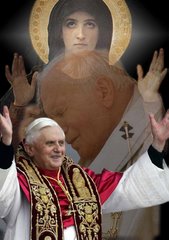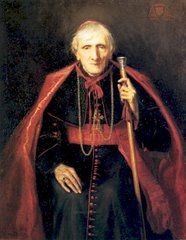The prepared text of founding Parousian Caleb Bernacchio's final presentation to the Parousians before he leaves for the Angelicum:
“THE REDEEMER OF MAN, Jesus Christ, is the centre of the universe and of history” (Redemptor Hominis I.1.). John Paul's words express the essence of Christianity. In Jesus Christ God did a new thing; nothing has point or purpose except in relation to the life, death and resurection of Jesus Christ, through which He revealed the Holy Trinity including the Father's great love for us. Now consider Benedict's quote from Paleologus, 'Show me just what Mohammed brought that was new, and there you will find things only evil and inhuman, such as his command to spread by the sword the faith he preached' (Lecture at Regensburg). Since John the Baptist proclaimed, “"Behold, the Lamb of God, who takes away the sin of the world” (NAB John 1.29) Christians have been committed to denying the possiblity that any other relgion or any other prophet could ever bring anything of signifigance to man's understanding of God and His relationship to the world. Why do Muslims and the media find it odd that Pope Benedict does not think that Mohammed had any new and fantastic knowledge about God and man? The pope did not intend to make these words his own nor did he deny that there are positive elements in Islam but toleration cannot be indifference.
Now back to Regensburg; the pope begins by expressing his excitement “to stand and give a lecture as this university podium, once again” (LR). 'Once again,' he says; this is not an encyclical or a homily but rather a university lecture. Further on he points out that in his days as a professor, “That... it is still necessary to raise the question of God through the use of reason, and to do so in the context of the Christian faith: this, within the university as a whole, was accepted without question” (LR). This is not the case today. That the university would raise the question of the rationality of the Islamic conception of God is hard to imagine, nor can one question the rationality of todays's dominant secularism. Asking metaphysical questions is considered a sign of madness according to some psychological manuals. One characteristic of the university, conceived as forum in which all claims must demonstrate their rationality, is its opposition to violence. Wisdom, St Thomas says, sets things in order. Reason has the abilty to understand the order of things and, through this knowledge, it can allow everything to have its proper place. Violence disregards the current order of things and instead imposes its own order. This search for wisdom as a search for the order of things is what Benedict takes to be the universities raison d'etre.
Benedict says he was reminded of this, by reading the dialouge, which included the above mentioned quote. This wide ranging dialouge between a Muslim and Christian points to the necessity, in our times especially, for rational investigation; we live in strange times and we need to figure just what it is that we are doing. The emperor's interlocuter was very learned in “Christianity and Islam, and the truth of both” (LR). We hear much today about dialogue. Dialogue promotes ' mutual understanding' and 'sharing of feelings' but the idea that truth is the telos towards which dialogue is ordered is all but absurd. This goal of dialogue can only be achieved through sharp objections and quick responses. This is what Benedict attempts regarding the issue of violence and the nature of God.
“Is the conviction that acting unreasonably contradicts God's naturemerely a Greek idea, or is it always and instrinsicly true?” is Benedict's question. Embodied in this are two distinct understandings of God and his relationships to man, including two conceptions of man's freedom. The mature Catholic understanding of God, shaped by the interplay between Greek and Hebrew thought, with beginnings in Old Testament times, epitomized by St Thomas Aquinas, is the God of Wisdom. “Indeed, she [Wisdom] reaches from end to end mightily and governs all things well” (Wisdom 8.1). It is beyond the scope of this paper to present and defend the the topic of Book 1, Chapter 86 of the Summa Contra Gentiles, 'That a Reason Can Be Assigned to the Divine Will'. This pressuposes Thomas's notion that God is all good, that he necessarily wills His own Goodness, and that all created goods are only good insofar as they are ordered to the Divine Goodness but I will ask the questions, Which God should we obey? And how can we avoid the manipulative claims of false gods?
These are questions relevant to not only all theists but also to many atheists, who have merely rejected a fictional god. One such god is William Blake's Nobodaddy.
To Nobodaddy
Why art thou silent & invisible
Father of jealousy
Why dost thou hide thyself in clouds
From every searching Eye
Why darkness & obscurity
In all thy words & laws
That none dare eat the fruit but from
The wily serpents jaws
Or is it because Secresy
gains females loud applause
Nobodaddy is a far and away transcendedent god, whose words and laws are couched in 'darkness and obscurity'. His ways cannot be known and so all of his laws and precepts appear abitrary and pointless. In Benedict's words, this god seems 'capricious'. Because of his abitrary commands and supreme power the only proper response is unconditional submission. But how could we know if this god is the correct one? Can the choice of this god be a rational choice? By what criteria could we make this judgement? IS it merely a flip of a coin?
The proponents of Nobodaddy and god's like him, are in somewhat of a dilemma, for on the one had they cannot be sure Nobodaddy is the right god – perhaps Zeus should be worshipped (the god who is a member of this universe) – because so many other gods are demanding worship, but on the other, because they have forsworn any standards by which to evaluate the claims of the many gods, because this would bring god down to our level and judge him by our standards (so they claim) they have no way sorting out these claims. Bear in mind that Nobodaddy shares a lot of characteristics with Allah.
Benedict remarks that dehellenization – this is virtually synonomous with attempts to tear asunder faith and reason - has progresses in three stages, beginning with the Reformers , who, in some cases legitamately, rejected the decadent and stagnent metaphysics of the late scholastics. This stage was followed, by the liberalism of 19th and 20th centuries. In this period, “The fundamental goal was to bring Christianity back into harmony with modern reason” (LR). This is complemented by the third stage, which, in the name of pluralism, seeks to return to a fictional pre-Greek Christianity that can be freshly imported into any cultural milleau.
The proponents of dehellinization are the mirror image of the proponents of Nobodaddy; they define reason in such a way that faith is unreasonable – just as faith in Nobodaddy is unreasonable – but instead of submission they reject any and all faith. Two underlying presuppostions of this viewpoint, Benedict remarks, are a strange combination of Catesian rationalism and a positivistic empericism. This position – basically Kantian – is characterized by a self-limitation of reason; reason is limited to mundane enterprises because it is impossible to reach absolutely certainity in metaphysics. The rationalist element seeks a mathematical cetaintity that is simply unattainable in any subject matter except mathematics. By setting the epistomological bar so high – using a fictional standard of certainty – the proponents of this version of modern rationality affirm a positivistic emerpicism; i.e., they claim the only valid knowledge we have is derived from the natural sciences. But because we have good reasons for rejecting any form of Cartesianism, reasons Aristotle formulated in one way and Wittgenstein in another, we are not stuck with this materialist postivism.
In the the Catholic tradition, faith and reason are in perfect haromony; reason is not destroyed to make room for faith nor is faith restricted to stay within the bounds of pure reason alone. As St Thomas said, Gratia non tollit sed perficit naturam. We can see this within the Bible. In the book of Genesis, God's action in creating the world is expressed symbolically, and as St Thomas noted, the author did not intend to write a piece of natural science. In the psalms this symbolism, while still present, tends to fade into the background behind the enduring message that God is the cause of all that is. In the Book of Wisdom,, it is said of Wisdom that, “Indeed, she reaches from end to end mightily and governs all things well” (Wisdom 8.1). And in one of St Augustine's favorite passages, “But you have disposed all things by measure, number and weight” (Wisdom 11.20 b). This pregression culminates, as Pope Benedict noted, in the Prologue of John's gospel: “In the beginning was the Word, and the Word was with God, and the Word was God. He was in the beginning with God. All things came to be through him, and without him nothing came to be” (John 1.1-3a). We see a progression in the Jewish and Christian understanding of God, which culminates in the mature understanding that God is essentially Wisdom, and that all created knowledge is a faint participation in this Divine Wisdom.
Indeed, St Paul, forshadowing the First the Vatican Council, affirms that God can be known from creation through reason; “Ever since the creation of the world, his invisible atribute of eternal power and divinity have been able to be understood and percieved in what he has made” (Romans 1.20).
Christians, taking up the best of Greek philosophy, and paying heed to St Paul's statement, have sought to explain why the God of Abraham, Isaac and Jacob, is eminently reasonable and how this can be known from the world. In the beginning of the Summa Theologica, in the famed Five Ways, St Thomas points to five elements of the created world – motion, causality, contingency, perfections of things, and order – that can not be adequately explained without resort to a Cause that is transcendent, that is not a part of the universe. These arguments are rooted in practical and theoretical investigations of a wider scope. Because of who and what we are, we humans beings naturally seek to understand the causes of the events of nature and the world in general, and likewise twe seek to find happiness, we seek the Good. These natural orientations of human nature lead to a historically and analogically ordered set of partial answers to these questions. Greeks philosphers were able to discover that a transcendent cause was the possible explanation of things: they also realized that the cultivation of virtue, in a search for the good, was the only way to aproximate happiness but this endeavors based on reason were only partially successful. Very few were able to attain an adequate understanding of these philosophical arguments and this not without a remaining in very many and great errors. But in the practical side the problems were even worse. The good life, one characterized by virtue, is fleeting at best; accidents and illnesses along with the jealousy and envy of others, make it likely that this form of life will end in some form of tradgedy. But this is not the half of it; St Augustine, and St Paul before him, recognized a radical weakness in his will. He found that his will was disordered, that “What I do, I do not understand. For I do not do what I want, but I do what I hate” (Romans 7.15).
Reason, without explicit revelation, was able to come to understanding of a Transcendent Cause, a Cause responsible for the existence of the universe, all of the individual perfections – justice ,goodness, beauty – present within the universe, the order of the universe, and that the knowledge and contemplation of this Cause, is the closest aproximation of happiness that humans can achieve. Reason was also able to come to some understanding that human beings habitually fail to do those things that enable them to understand the truth and to find happiness, the good. When this partial understanding – along with the knowledge of the sinfullness of fallen humanity (which was a result of the Holy Spirit's convicting the world of sin) – is presented with the Gospel, it percieves its fullfillment and its medicine. Not to act reasonably (according to the natural law) is contrary to the nature of God because we truly learn – albeit in an obscure fashion – about the nature of God through our rational reflections on the world. And if some purported god commands that we act with violence, against the natural law, then that god is not real. Because our knowledge of the natural law, derived from reason, is truly knowledge of Divine Wisdom, who 'orders all things sweetly' (Wisdom).
Pope Benedict calls western scientific rationalism to reflect on the presumptions that make the scientific enterprise possible. As he says:
Modern scientific reason quite simply has to accept the rational structure of matter and the correspondence between our spirit and the prevailing rational structures of nature as a given, on which its methodology has to be based. Yet the question why this has to be so is a real question, and one which has to be remanded by the natural sciences to other modes and planes of thought: to philosophy and theology. (LR)
The pope calls us to reflect on all of our experience – data from the natural world, but also from history, religious experience and communal relationships – and to reject the artficial limitations that have been put on reason by those who do not want to face the consequences of the existence of God of Justice. The fact that the world is intelligible, that science has achiveived magnificent success, entails that God exists. Because it is only if every event has a cause or is explanatory of itself (and only God's essence is His existence) can the rational order of nature be maintained.
“The West has long been endangered by this aversion to the questions which underlie its rationality,” say's Pope Benedict, “and can only suffer great harm thereby” (LR). If the West does not reject these artificial limitations placed on Reason it will not be able to stand up against a violent branch of Islam that seeks its destruction, but even worse it will lose its great moral tradition, and give in to corporate and govermental power and greed, and may not know if it has anything to live for.
In closing let's reflect on this understanding of Faith and Reason which is captured well by the closing prayer for today, the 25th Sunday of Ordinary Time
Father,
guide us, as you guide creation
according to the law of love.
May we love one another and come to perfection in the eternal life prepared for us.
We ask this thorugh our Lord Jesus Christ, your Son,
who lives and reigns with you and the Holy Spirit,
one God, forever and ever.
-Amen"
Tuesday, September 26, 2006
Subscribe to:
Post Comments (Atom)






1 comment:
Regarding the idea of man placing reason and empirical data on a pedestal, I found something interesting in Fides et ratio while reading it today (italics are my own):
"Therefore, following upon similar initiatives by my Predecessors, I wish to reflect upon this special activity of human reason. I judge it necessary to do so because, at the present time in particular, the search for ultimate truth seems often to be neglected. Modern philosophy clearly has the great merit of focusing attention upon man. From this starting-point, human reason with its many questions has developed further its yearning to know more and to know it ever more deeply. Complex systems of thought have thus been built, yielding results in the different fields of knowledge and fostering the development of culture and history. Anthropology, logic, the natural sciences, history, linguistics and so forth—the whole universe of knowledge has been involved in one way or another. Yet the positive results achieved must not obscure the fact that reason, in its one-sided concern to investigate human subjectivity, seems to have forgotten that men and women are always called to direct their steps towards a truth which transcends them. Sundered from that truth, individuals are at the mercy of caprice, and their state as person ends up being judged by pragmatic criteria based essentially upon experimental data, in the mistaken belief that technology must dominate all. It has happened therefore that reason, rather than voicing the human orientation towards truth, has wilted under the weight of so much knowledge and little by little has lost the capacity to lift its gaze to the heights, not daring to rise to the truth of being. Abandoning the investigation of being, modern philosophical research has concentrated instead upon human knowing. Rather than make use of the human capacity to know the truth, modern philosophy has preferred to accentuate the ways in which this capacity is limited and conditioned."
Also, Caleb, awesome presentation, and I'm glad it has been posted, so I can read over it.
-Mary Grace
Post a Comment